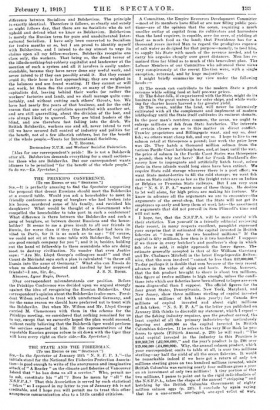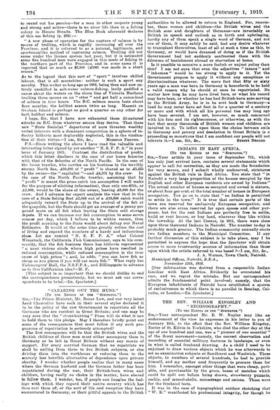THE STATE AND THE FISHERMAN.
[To ran EDITOR or sat " Seterama."l
Ste,—Iu the Spectator of January 11111 N. S. F. P. A."—the initials stand for the National Sea Fisheries Protection Associa- tion—is good enough to write of the anonymous and imaginative attack of " A Reader " on the climate and fisheries of Vancouver island that "he has done us all a service." Who, permit me to ask, constitute his "all "? Does he mean by "all" the N.S.F.P.A.? That this Association is served by such statistical " fakes " as I exposed in my letter to you of January 4th is not creditable, and I hope you will permit me to treat this other anonymous communication also to a little candid criticism. A Committee, the Empire Resources Development Committee —most of its members have filled or are now filling public posi- tions—are of the opinion that the ocean, requiring a much smaller outlay of capital from its cultivators and harvester. than the lend requires, is capable, acre for acre, of yielding at least as much food as the land: that Providence has for a thousand years invited Man to regard the prodigious expanse of salt water as designed for that purpose—namely, to feed hint.
to supply his State with much of the revenue needed, and to
carry his argosies cheaply over greet distances. Man has re- mained tints far blind as to much of this benevolent plan. The
Labour Members of our Committee who advanced these views very conspicuously at the recent Election were, with a single exception, returned, and by huge majorities.
I might briefly summarize my view under the following heads:—
(1) The ocean can contribute to the modern State a great revenue while selling food at half pre-war prices.
(2) The fisher-folk, if co-partnered with the State, might do its business in the great waters in far safer ships, and while work- ing far shorter hours harvest a far greater yield.
(3) The ocean, unlike the land, will never be intensively cultivates! with all the complement and implement of .modera ichthyology until the State itself cultivates its eminent domain. In the poor men's rent-free common, the ocean, we ought le enlarge millions of fish from State hatcheries. The interests of certain classes are as to this matter in direct conflict. Trawler proprietors and Billingsgate want, and soy HO, dear fish; we others want cheap fish, and say so. I hope to live to sea salmon retail at threepence a pound; last week the price hers was 22s. They hatch a thousand million salmon front the various Pacific Coast hatching-boxes, and, at least until the war, the price of salmon in the Pacific Coast Stales was threepence a pound; then why not here? But for Frank Buckland's dis- covery how to impregnate and artificially hatch trout. soloa farie in these islands would long since have been extinct. We require-State cold storage wherever there is a post office; we want State motor-lorries to fill the cold stornge; we want fish rates on State railways as low as the freight rates are on Indian or Belgian or Prussian State railway, But I am very sure that " N. S. F. P. A." wants none of these things. He desires to let well alone, for high prices are making his fortune. We know in advance all the arguments we are to encounter—the arguments of the sweat-shop, that the State will not get its employees up early end keep them at work late—the assortment of arguments that did not prevail in Sam Plimsoll's time and will not now.
I hope, too, that the N.S.F.P.A. will be more careful with their statistics. You yourself in a friendly editorial reviewing their recent, in many respects excellent, pamphlet expressed your surprise that it estimated the capital invested in British fisheries at "from fifty to two hundred millions." If the capital is fifty millions, how then is it two hundred? I suppose if we threw in every butcher's and poulterer's shop in which fish oleo is sold, it might approach the lower figure. The estimate generally accepted is that of Sir William tiarstang and Dr. Chalmers Mitchell in the latest Encyclopaedia Britan- nic°, that the sum involved "cannot be less than 212.000,000." To-day perhaps it is double that sum because of the very recent advanee in the value of ships and boats. Seeing, however, that the fish product brought to shore is about ten million., this figure of twelve millions is high enough, unless the condi- tions into which our fisheries have been allowed to lapse are even more disgraceful than I suppose. The official figures for the four great States, Pennsylvania, New York, Maryland, and New Jersey. show three millions sterling of capital invested and three millions of fish taken yearly; for Canada fire millions of capital invested and about eight millions of fish taken. " N. S. F. P. A." in the letter you published on January 11th thinks to discredit my statement, which I repeat— that the fishing industry requires, qua the product earned, the least capital of all the primary industries—by meticulonely figuring out 6:800,000 as the 'capital invested in British Columbian fisheries. If he refers to the very Blue Book he pro- fesses to quote (Fiftieth Anneal, p. 239) he will read: "The total capital invested in the industry in this Province is 110,369,79'3 (22,000,000)." and the year's product is (p. 230) over I19.000,000 (.t4,000,000). Why, the annual ealmon product, which your correspondent omits to table at all, is over two milliona sterling—my half the yield of all the ocean fisheries. It would be remarkable indeed if we here got a return of only ten millions sterling gross on two hundred milliona invested, while British Columbia was earning nearly four millions gross a year on an investment of only two millions! A tiny portion of this two millions, I pause to point out to the rigid individualists of the N.S.F.P.A., takes the shape of the annual "stripping" and hatching by the British Colombia Government of eighty million salmon eggs (p. 237). I conclude by again saying that for a one-armed, one-legged, one-eyed Juliet of war, to round out his pension—for a man in other respects young and strong and active—there is no nicer life than in a fishing colony in Hecate Straits. The Blue Book aforesaid declares of this sea fishing (p. 231):- " A new phase of operation for the capture of salmon is by means of trolling, which is rapidly increasing all over the Province, and it is referred to as a natural, legitimate, and sportsmanlike method of capturing salmon. Trolling slid not come under the licence system last year, but it is estimated some five hundred men were engaged in this mode of fishing in the northern part of the Province. and in some cases it is reported that as much as 02.500 1,0500) was made in a short season."
As to the legend that this sort of "sport" involves skilled labour, that is all moonshine: neither is such a sport any novelty. This writer so long ago as 11303, being then and now en- tirely unskilled In salt-water salmon-fishing, lazily paddled a canoe about the waters on the shore line of Victoria Harbour trailing three spoons on an " otter " and got half a canoe-load of salmon in four hours. The B.C. salmon season lasts about four months; the halibut season twice as long. Massett on Graham Island is perhaps as good a quarter as any other for both halibut and salmon.
I Lope, Sir, that I have now exhausted these ill-natured attacks on B.C. from whatever source they derive. That these new " State Socialist" departures of ours threaten wealthy vested interests with a dominant competition in a sphere of in- dustry hitherto most deplorably neglected, this is•the vindica- tion of their virtue.—I am, Sir, Ac., MORMON Faswee.
P.S.—Since writing the above I have read the valuable and interesting letter signed by yet another " N. S. F. P. A." in your issue of January 18th. Contrast the distribution of profits which this letter diaoloees in the case of our home fisheries with that of the fisheries of the North Pacific. In the case of the home trawler, who carries on his business in the terribly stormy North Sea, £10,000 of " profit " is shared as to 45,625 by the owner—the " capitalist "—and 44,376 by the crew. In the case of the North Pacific trawler, assuming that by " profit " is meant the gross catch (an assumption I will make for the purpose of eliciting information), then only one-fifth, or £2,000, would be the share of the owner, leaving J18,000 for the crew. And I advance for expert analysis the view that in the case of a State fishing fleet ..e2,000 out of a .210,000 catch would adequately reward the State up to the arrival of the fish at the quayside, but the State should get an average of a penny per pound more on all fish when leaving the State cold storage depots. If we can increase our fish consumption to some seven ounces per day, which I believe to be within reason, then the profit accruing to the State would about defray our Naval Estimates. It would at the same time greatly reduce the cost of living and expand the numbers of a hardy and industrious class. Let me remind "N. S. F. P. A." what Colonel Winestock, the California Fish Commissioner, says to his com- munity, that the fish business there has hitherto represented "a most vicious circle where high prices have resulted in reduced consumption, while reduced consumption is the true came of high prig"; awl, he adds, "you can have fish as cheap as you please if you will eat more fish." What reply has Fishmongers' Hall, the N.S.F.P.A., and Billingsgate to advance as to this Californian idea?-11. F.
[This subject to so important that we should dislike to end the correspondence prematurely, but we must ask our corre- spondents to be brief.—En. Spectator.]



































 Previous page
Previous page